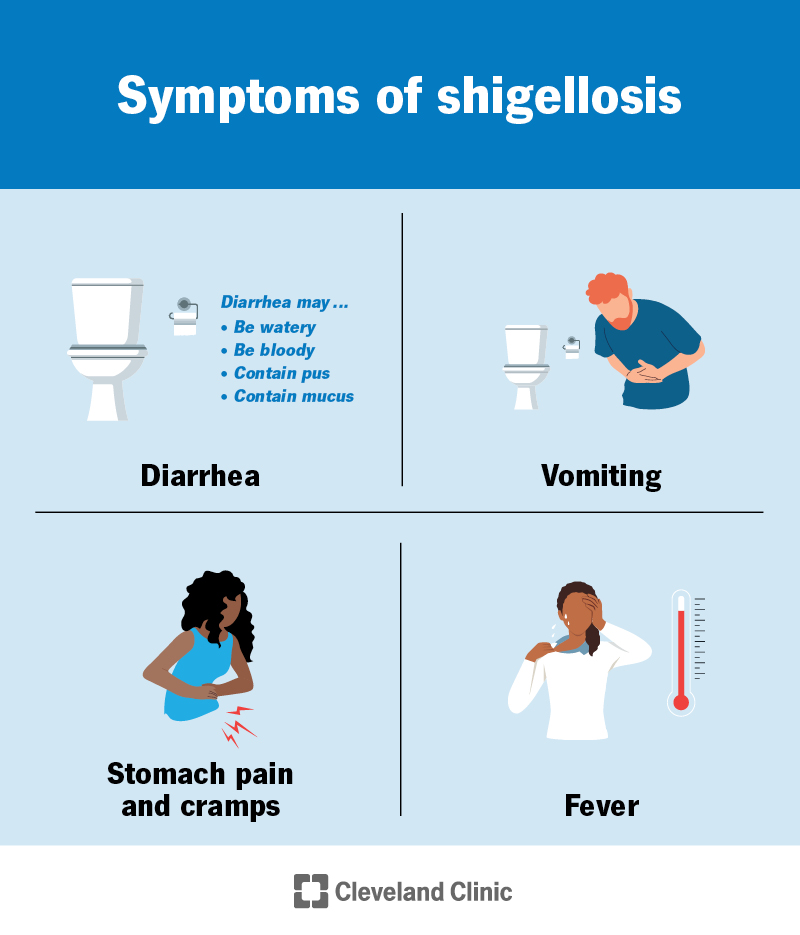Shigellosis is an infection with Shigella bacteria. It causes diarrhea, vomiting, fever and stomach pain. You can get it from other people, contaminated food or from natural bodies of water like lakes and rivers. Shigellosis can get better on its own. But if your case is severe, you might need antibiotics. Drink plenty of fluids to stay hydrated.
Advertisement
Cleveland Clinic is a non-profit academic medical center. Advertising on our site helps support our mission. We do not endorse non-Cleveland Clinic products or services. Policy

Image content: This image is available to view online.
View image online (https://my.clevelandclinic.org/-/scassets/images/org/health/articles/shigellosis.jpg)
Shigellosis is an infection with Shigella bacteria. It causes diarrhea and other digestive symptoms.
Advertisement
Cleveland Clinic is a non-profit academic medical center. Advertising on our site helps support our mission. We do not endorse non-Cleveland Clinic products or services. Policy
You might get Shigella from being around someone who has the infection — like if you touch the same surfaces or if you’re taking care of them while they’re sick. It may also contaminate bodies of water (think lakes and rivers) or foods you eat.
Shigellosis commonly causes diarrhea. This can be watery or bloody. It might also contain mucus or pus. Other symptoms include:
This combination of symptoms is also called bacillary dysentery.
You can also have a Shigella infection without symptoms. Even then, you can still be contagious.
Shigella bacteria cause shigellosis. You get it through contact with infected poop. It most commonly spreads through close contact with other people, especially in daycares or other places where people live or work closely with others. You can also get it from:
Advertisement
People who are at a higher risk of Shigella infections include:
Shigella infections can sometimes lead to complications. These include:
A healthcare provider can sometimes diagnose shigellosis based on your symptoms. They might test a sample of your poop (stool) to confirm.
If your symptoms are manageable, you can usually take care of yourself at home until you feel better. Drink plenty of fluids to prevent dehydration. Ask your provider before taking anti-diarrheal medications. They can sometimes make symptoms worse and make the illness go on longer than it needs to.
In severe cases, you may need antibiotics to treat shigellosis. Your provider may prescribe ciprofloxacin or azithromycin. Take all antibiotics as prescribed, even if you start feeling better. If you become dehydrated, you’ll need treatment with fluids in the hospital.
Talk to a healthcare provider if you or someone in your family has diarrhea, especially if it lasts a long time. Go to the emergency room if you have severe diarrhea, vomiting, cramping or bloody diarrhea.
Most people with shigellosis feel better within about a week. But severe cases can last several weeks. Sometimes, it can take a few months for your body to feel like it’s returned to normal.
You can reduce your risk of a Shigella infection with these safety measures:
Shigella infections are common and usually not serious — though, certainly, no one likes dealing with a bout of diarrhea. Drinking plenty of fluids can reduce your risk of complications. See a healthcare provider right away if you have signs of dehydration or if your symptoms last longer than a week.
Advertisement

Sign up for our Health Essentials emails for expert guidance on nutrition, fitness, sleep, skin care and more.
Learn more about the Health Library and our editorial process.
Cleveland Clinic’s health articles are based on evidence-backed information and review by medical professionals to ensure accuracy, reliability and up-to-date clinical standards.
Cleveland Clinic’s health articles are based on evidence-backed information and review by medical professionals to ensure accuracy, reliability and up-to-date clinical standards.
Need care fast? Cleveland Clinic’s Express Care and Urgent Care locations treat everything from sprains to sinus infections — no appointment needed.
